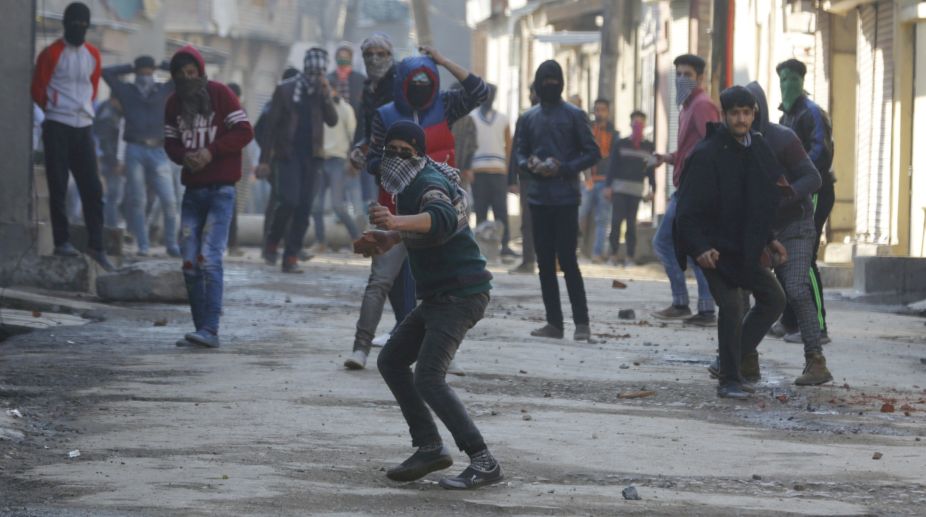Whether stone pelting in Kashmir is at the behest of Pakistan or is a response to fundamentalists’ call, the fact remains that the valley is disturbed. Scores of schools have been burnt and there is a fear in the mind of students that they would be punished if they were to attend classes. The separatists are said to be leading a movement to boycott studies.
The result is that students are finding it hard to prepare and appear in exams which the rest of the country is holding peacefully. The separatists should realize that a political movement cannot and should not make students helpless and make them suffer. The fallout of the agitation is that the tourists’ inflow has reduced. So much so, Syed Ali Shah Geelani has led processions through the streets of Srinagar to assure tourists that they would be protected in all eventualities.
Advertisement
Still whatever the assurance, the tourists have come to prefer different hill stations to Kashmir. It is understandable from the tourists’ point of view but in the process the Dal Lake shikaras and Nagin Bagh dongas are not getting business. An ordinary Kashmiri is suffering. Even otherwise, the state’s economy has been badly hit.
Chief Minister Mehbooba Mufti does not seem to have any clue to the situation. She has said many a time that Prime Minister Narendra Modi is the only person who can solve the crisis in Kashmir. She is probably underlining the alliance between her People’s Democratic Party and the BJP which is ruling at the Centre.
New Delhi should, however, analyse why a person like Shabbir Shah, once pro-India, has turned himself to be pro-azadi. Probably, he does not find the space which he direly needs to direct his affairs in the valley. The BJP has had no contact with persons like him. The same is the case with Yasin Malik who wanted a solution within the Indian Union. But New Delhi has stretched Article 370 in such a way that the power has come to be concentrated at New Delhi.
Kashmir also feels strongly about New Delhi’s step-motherly treatment meted out to the Urdu language. And it is generally believed that Urdu is languishing in neglect because it is considered the language of Muslims. If New Delhi were to own and encourage Urdu, it would give the Kashmiris at least one less reason to feel aggrieved. People are generally poor like in the rest of India and they want jobs which they realise would come only through development, including tourism.
Till recently, the Kashmiris were opposed to picking up the gun to defy New Delhi. Home Minister Rajnath Singh has been relentlessly pursuing some method to help Kashmir return to normalcy. But, unfortunately, the Kashmiris have a feeling that what the militants are trying to do gives them identity. Therefore, the criticism that there is no resistance to the militants from within the valley should be understood as a part of alienation.
It is unfortunate that New Delhi did not give the package which it had announced after the devastation through floods in Kashmir a couple of years ago. There was no criticism by the media or political parties. No leader has pointed out to New Delhi that it had reneged on the promise. All these are interpreted in Kashmir as deliberate signs of a cursory attitude. I still believe that the 1953 agreement which gave India the control of defence, foreign affairs and communications can improve the situation in the state.
The Kashmiri youth who are angry over the state’s status as well the situation can be won over by the assurance that the entire Indian market would be available to them for business or services. But this alone may not do. New Delhi will have to withdraw all the acts relating to fields other than defence, foreign affairs and communications. The Armed Forces (Special Powers) Act which was promulgated some 26 years ago to meet the extraordinary situation in the state is still in operation. Were the government to withdraw the act, it would placate the Kashmiri on the one hand and make the security forces more responsible on the other.
The National Conference waged a long war to get rid of Maharaja Hari Singh and had an icon like Sheikh Abdullah to provide secular and democratic rule to the state. But the party suffered defeat in the assembly polls due to its proximity to New Delhi. The PDP won because its founder, Mufti Mohammad Sayyed, kept his distance from New Delhi, without alienating it.
The Kashmiris have voted for the untried PDP-BJP alliance because the combination gave them a feeling of identity. Omar Farooq Abdullah had to pay the price of National Conference’s image of being pro-Delhi. Kashmir’s links with India are too close to challenge it beyond a point. Still the opposition, however small, gives the Kashmiris a vicarious satisfaction of defying New Delhi.
Lord Cyril Radcliffe did not attach any importance to Kashmir. He was a judge in London who drew the line between India and Pakistan to establish two separate countries. He told me many years later during an interview that he never imagined that Kashmir would assume as much importance as it did. I recalled this instance when I was in Srinagar a couple of years ago to preside over the first anniversary of an Urdu magazine. Urdu has been unceremoniously ousted from all the states, including Punjab where it was the main language until some years ago. In fact, the language lost its importance in India soon after Pakistan made it the national language.
Normalcy is also a state of mind. The Kashmiris must feel themselves that their identity is not under attack and that New Delhi realises the importance of what the Kashmiris desire. What New Delhi has to appreciate is that the Kashmiris' desire to distance themselves from India may not be considered any meaningful transfer of power from New Delhi to Srinagar. Yet the impression that the Kashmiris rule themselves has to be sustained whatever the cost.
The writer is a noted journalist columnist and commentator











